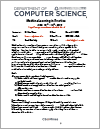Check-in is required for all participants on the first day of attendance. A continental breakfast is available before class on each day. Breaks are scheduled in the morning and afternoon.
The Machine Learning in Practice course is split in to the following segments:
Segment 1: Introduction and Supervised Learning Methods
In this segment, we introduce machine learning and how it differs from Artificial Intelligence (AI). We go over some definitions that we will use throughout the course and an overview of what's to come. We then cover some popular supervised learning methods and apply them to labeled datasets. In this portion we also focus heavily on evaluating supervised learning models.
Segment 2: Unsupervised Learning and Feature Learning
In this segment, we cover unsupervised learning methods for detecting patterns in unlabeled data, and methods for feature learning including dimensionality reduction methods. You will learn how to reduce the complexity and efficiently use complex data to perform machine learning tasks.
Segment 3: Deep Learning
In this segment, we cover an overview of Deep Learning methods that utilize neural networks to solve machine learning problems. We will cover a variety of networks including feed forward neural networks, convolutional neural networks, and recurrent neural networks.
Segment 4: Application in Computer Vision and Natural Language Processing
In this segment, we provide some background about two crucial application areas in machine learning, namely computer vision and natural language processing. We then go over examples of how to apply machine learning to these examples. This should provide you with examples that can translate to other application areas such as your area of expertise.
Segment 5: Reinforcement Learning
In the final segment, we cover one of the most exciting areas of machine learning, reinforcement learning, by which models can learn from experience through rewards and punishment. This approach doesn't apply to most fields but can be extremely effective when it is the appropriate approach. We will also cover some real world examples of reinforcement learning.
Lecture Structure and Administration
The course will take place over the span of 5 days with each day containing two 3-hour lecture sessions with a break in the middle. Each 3-hour lecture consists of 3 sub-lectures each of which involves a short lecture followed by an exercise where students apply what they learned then a discussion of the solution.
In addition to the in-class exercises that students will complete throughout the course, students can complete an optional project within one month of course completion and receive instructor feedback.
The instructors will provide course materials, including handouts and presentation slides, that are sufficient for the course. Students can find further details about the content covered in the following references:
- Pattern Recognition and Machine Learning, by Christopher M. Bishop.
- Machine Learning: a Probabilistic Perspective, by Kevin Patrick Murphy.
- The Elements of Statistical Learning: Data Mining, Inference, and Prediction, 2nd Edition, by T. Hastie, R. Tibshirani, J. H. Friedman.
- The Proceedings of the International Conference on Machine Learning (ICML)
- The Proceedings of the Annual Conference on Neural Information Processing Systems (NeurIPS)
 |
A 2-page flyer with more information is available for download. |
